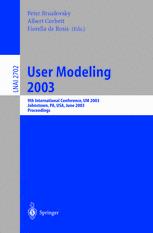

Most ebook files are in PDF format, so you can easily read them using various software such as Foxit Reader or directly on the Google Chrome browser.
Some ebook files are released by publishers in other formats such as .awz, .mobi, .epub, .fb2, etc. You may need to install specific software to read these formats on mobile/PC, such as Calibre.
Please read the tutorial at this link: https://ebookbell.com/faq
We offer FREE conversion to the popular formats you request; however, this may take some time. Therefore, right after payment, please email us, and we will try to provide the service as quickly as possible.
For some exceptional file formats or broken links (if any), please refrain from opening any disputes. Instead, email us first, and we will try to assist within a maximum of 6 hours.
EbookBell Team

4.4
32 reviewsThe International User Modeling Conferences are the events at which research foundations are being laid for the personalization of computer systems. In the last 15 years, the field of user modeling has produced significant new theories and methods to analyze and model computer users in short and long term interactions. A user model is an explicit representation of properties of individual users or user classes. It allows the system to adapt its performance to user needs and preferences. Methods for personalizing human computer interaction based on user models have been successfully developed and applied in a number of domains, such as information filtering, adaptive natural language and hypermedia presentation, tutoring systems, e commerce and medicine. There is also a growing recognition of the need to evaluate the results of new user modeling methods and prototypes in empirical studies and a growing focus on evaluation methods. New trends in HCI create new and interesting challenges for user modeling. While consolidating results in traditional domains of interest, the user modeling field now also addresses problems of personalized interaction in mobile and ubiquitous computing and adaptation to user attitudes and affective states. Finally, with the spread of user modeling in everyday applications and on the Web, new concerns about privacy preservation are emerging. All these topics are covered in the proceedings of UM 2003, the 9th International Conference on User Modeling.